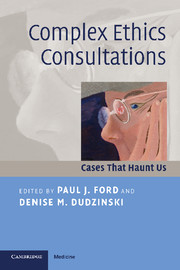Book contents
- Frontmatter
- Contents
- List of contributors
- Foreword
- Acknowledgments
- Introduction: Live and learn: courage, honesty, and vulnerability
- Part I Starting at the beginning: prenatal and neonatal issues
- Part II The most vulnerable of us: pediatrics
- Part III Diversity of desires and limits of liberty: psychiatric and psychological issues
- 9 Helping staff help a “hateful” patient: the case of TJ
- 10 Ulysses contract
- 11 Misjudging needs: a messy spiral of complexity
- 12 When the patient refuses to eat
- Part IV Withholding therapy with a twist
- Part V The unspeakable/unassailable: religious and cultural beliefs
- Part VI Human guinea pigs and miracles: clinical innovations and unorthodox treatment
- Part VII The big picture: organizational issues
- Conclusions, educational activities, and references
- Index
9 - Helping staff help a “hateful” patient: the case of TJ
Published online by Cambridge University Press: 03 May 2010
- Frontmatter
- Contents
- List of contributors
- Foreword
- Acknowledgments
- Introduction: Live and learn: courage, honesty, and vulnerability
- Part I Starting at the beginning: prenatal and neonatal issues
- Part II The most vulnerable of us: pediatrics
- Part III Diversity of desires and limits of liberty: psychiatric and psychological issues
- 9 Helping staff help a “hateful” patient: the case of TJ
- 10 Ulysses contract
- 11 Misjudging needs: a messy spiral of complexity
- 12 When the patient refuses to eat
- Part IV Withholding therapy with a twist
- Part V The unspeakable/unassailable: religious and cultural beliefs
- Part VI Human guinea pigs and miracles: clinical innovations and unorthodox treatment
- Part VII The big picture: organizational issues
- Conclusions, educational activities, and references
- Index
Summary
Case narrative
“Ted Jacob,” or “TJ,” was a patient who, we quickly learned, tested the ethical resilience of most of the health professionals who worked with him. He expanded our awareness of the types of conflicts that can be generated among the principles of nonmaleficence, beneficence, respect for persons, and autonomy.
TJ was 36 years old when the attending psychiatrist (KSW) on the consultation–liaison (C-L) psychiatry service first saw him. Both authors had heard about TJ from numerous health professionals because of the enormous problems he created on each admission. TJ, diagnosed with borderline personality disorder (BPD), characterized by intense emotional relationships, frequent crises resulting in suicidal ideation, and impulsive behavior, had been physically and sexually abused by his adoptive mother and ignored by an emotionally unavailable father. Beginning at age 11, he had numerous psychiatric admissions for attempted suicide and polysubstance abuse. His longest period of sobriety was during a marriage that lasted several years. TJ attended college for three years and majored in psychology. By history, he was bisexual, although his only known homosexual relationship was with his sponsor from Alcoholics Anonymous.
TJ had ten admissions for intentional drug overdoses and alcohol withdrawal within 12 months. He was first labeled a “hateful patient” when he was admitted to the hospital after telling his outpatient psychiatrist that he had eaten multiple boxes of rat poison with the intention of killing himself. Many more admissions due to sequelae of rat poison ingestion would follow.
- Type
- Chapter
- Information
- Complex Ethics ConsultationsCases that Haunt Us, pp. 75 - 80Publisher: Cambridge University PressPrint publication year: 2008



